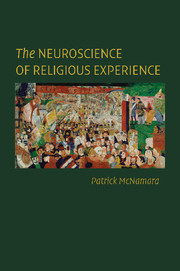Book contents
- Frontmatter
- Contents
- Preface
- Acknowledgments
- 1 God and the Self
- 2 On the Self and the Divided Self
- 3 Mechanisms and Dynamics of Decentering
- 4 Neurology of the Self
- 5 Neurology of Religious Experiences
- 6 Neurochemistry of Religiosity
- 7 Self-Transformation as a Key Function of Performance of Religious Practices
- 8 Self-Transformation through Spirit Possession
- 9 God Concepts
- 10 Religious Language
- 11 Ritual
- 12 Life-Span Development of Religiosity and the Self
- 13 The Evolution of Self and Religion
- References
- Index
Preface
Published online by Cambridge University Press: 30 October 2009
- Frontmatter
- Contents
- Preface
- Acknowledgments
- 1 God and the Self
- 2 On the Self and the Divided Self
- 3 Mechanisms and Dynamics of Decentering
- 4 Neurology of the Self
- 5 Neurology of Religious Experiences
- 6 Neurochemistry of Religiosity
- 7 Self-Transformation as a Key Function of Performance of Religious Practices
- 8 Self-Transformation through Spirit Possession
- 9 God Concepts
- 10 Religious Language
- 11 Ritual
- 12 Life-Span Development of Religiosity and the Self
- 13 The Evolution of Self and Religion
- References
- Index
Summary
Religion is a defining mark of humanity – as emblematic of its bearer as the web for the spider, the dam for the beaver, and the song for the bird. It is, at least partially, created by human beings, and we can learn much about ourselves by studying it as a product of our minds and bodies. Humanity not only creates religion but is also created by it. Religious beliefs and behaviors exert a profound impact on mental and physical health, dietary habits, mating preferences, and economic behavior. They sustain many lethal conflicts and help to heal many others. For billions of people the world over, religious experiences and beliefs influence who they marry, how they rear their children, whom they spend time with, and how they comport themselves in daily life. It may well be that we would not be as we find ourselves in the twenty-first century if our ancestors had not been intensely religious for most of the “life” of our species. It is high time that we have a real science of religion, and thankfully, breakthrough research on religion begun in the last decades of the twentieth century has culminated in the first decade of the twenty-first century in what is arguably the birth of a new science of religion rooted in detailed anthropologic, cognitive, and neuroscientific studies of the manifold features of religious experiences and in evolutionary approaches to religious experiences and behaviors.
- Type
- Chapter
- Information
- The Neuroscience of Religious Experience , pp. ix - xivPublisher: Cambridge University PressPrint publication year: 2009



